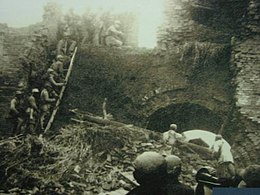Shangdang Campaign
| Shangdang Campaign | |||||||
|---|---|---|---|---|---|---|---|
| Part of Chinese Communist Revolution | |||||||
 |
|||||||
|
|||||||
| Belligerents | |||||||
|
Nationalist Government |
Communist Party of China |
||||||
| Commanders and leaders | |||||||
|
|
|
||||||
| Strength | |||||||
| ~35,000 | ~80,000 | ||||||
| Casualties and losses | |||||||
| 35,000, most of them captured | 4,708 | ||||||
The Shangdang Campaign (Chinese: 上黨戰役) was a series of battles fought between the Communist force under the leadership of Liu Bocheng and the nationalist Yan Xishan’s Kuomintang force. The Campaign lasted from September 10, 1945, through October 12, 1945. Like all other communist victories in the clashes immediately after Japanese's surrender in World War II, the outcome of this campaign altered the course of the peace negotiation held in Chongqing from August 28, 1945, through October 11, 1945, resulting in a more favourable outcome for Mao Zedong.
After the end of World War II, the conflict between the Communists and the Kuomintang resumed the intensity that it had had before the outbreak of the Second Sino-Japanese War. Under the direction of Chiang Kai-shek, the commander-in-chief of the second war zone, Yan Xishan, ordered the commander of the 19th Army, Shi Zebo (史泽波), to lead the 19th Army, part of the 61st Army, and other units, totaling more than 17,000 to invade the Communist base in the Shangdang (上党) region of southeastern Shanxi in the mid August, 1945. Three Nationalist divisions were stationed in the largest city of the region, Changzhi, while the rest were stationed in the following cities/towns: Xiangyuan (襄垣), Changzi (长子), Tunliu (屯留), Lucheng, Huguang (壶关), and other counties; and, from these newly established bases, the Nationalists planned to take the entire southeastern Shanxi region from the Communists. The Communists anticipated the Nationalist attack and mobilized 31,000 troops from the Taihang (太行), Taiyue (太岳), and Southern Hebei (冀南) military districts to prepare for the upcoming battles.
...
Wikipedia
